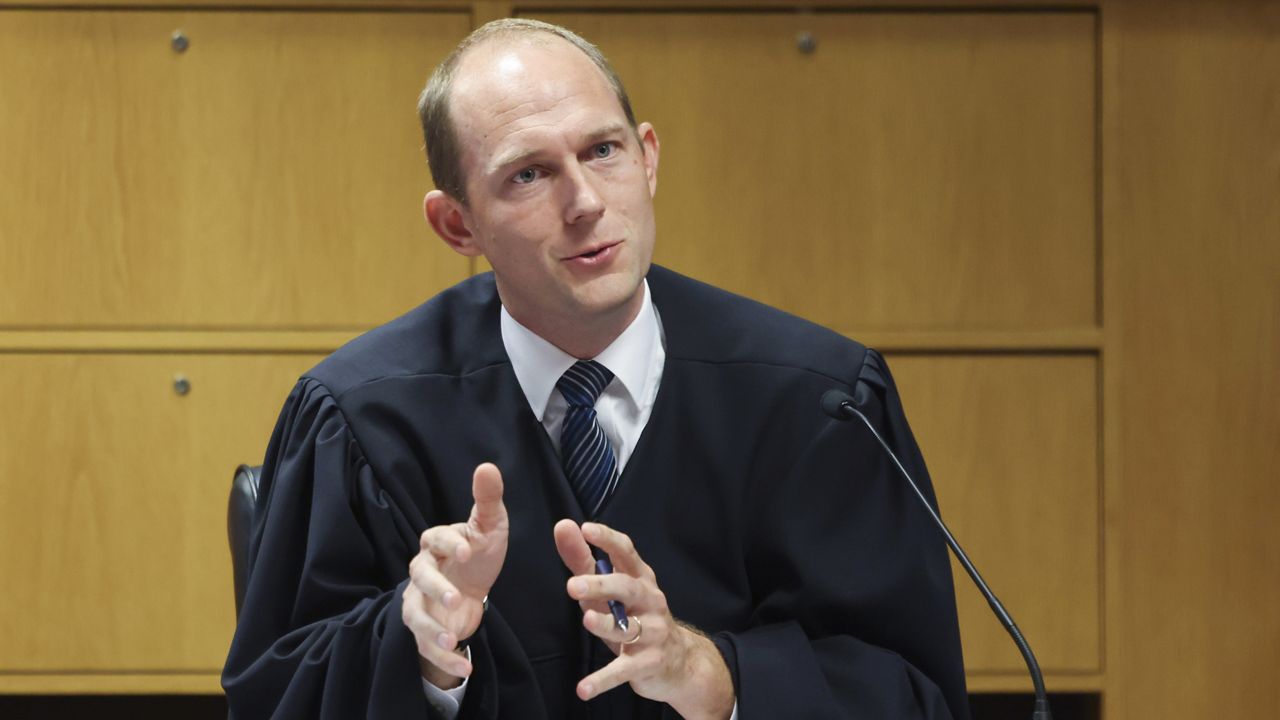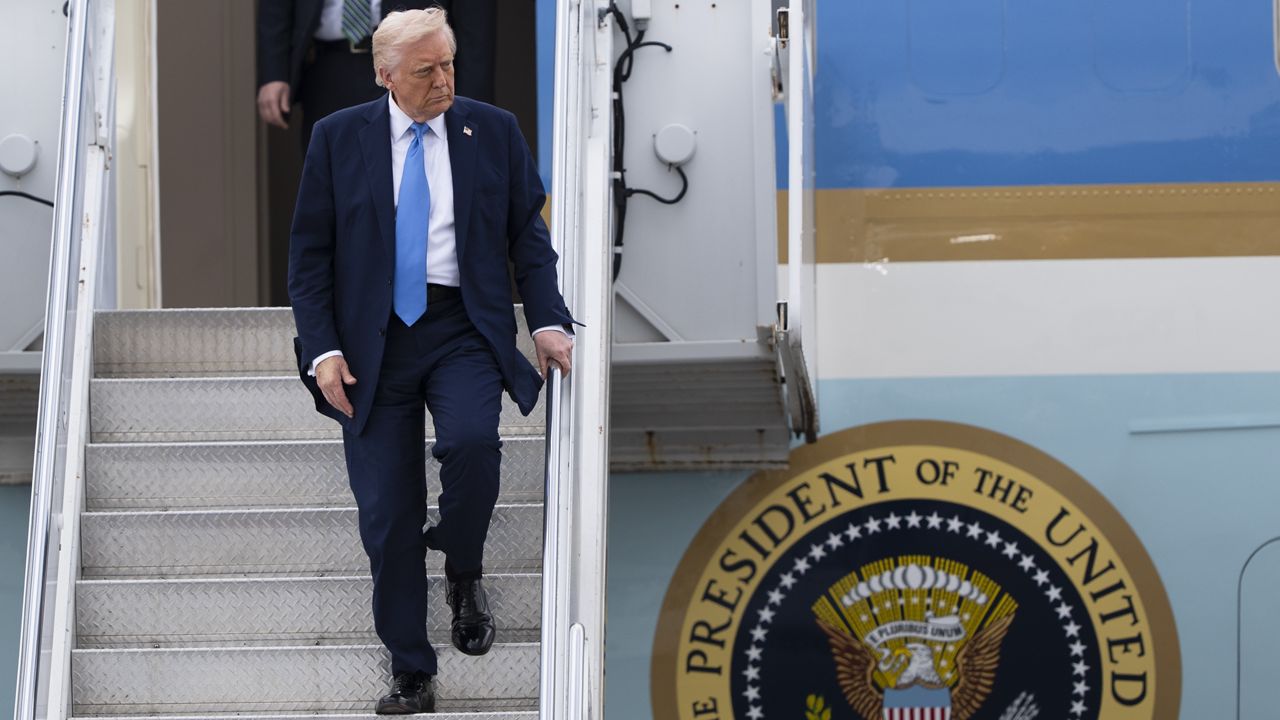Judge Peter Cahill hardly slept during the six weeks he presided over the murder trial of Minneapolis police officer Derek Chauvin for killing George Floyd.
What You Need To Know
- Past high-profile trials suggest additional scrutiny and stress for the four judges overseeing the indictments against former President Donald Trump
- But the challenge facing Fulton County Judge Scott McAfee in Georgia is unlike any of the others
- For one, he is the only judge to allow television cameras in the courtroom to broadcast hearings and any trials
- McAfee took the bench just this year, but attorneys who have worked alongside him say his demeanor and years of work as a prosecutor have prepared him for heightened pressure
Cameras in the courtroom broadcast the veteran Minnesota judge's every word to a global audience. Outside, the nation waited nervously for the outcome of a slaying that galvanized the movement for racial justice.
"When you're in a high-profile trial, you feel the stress, you feel the pressure even if you're not reading the papers," he told an audience of judges last year at The National Judicial College in Reno, Nevada.
Cahill's experience provides a glimpse of the additional scrutiny and strain that await the four judges overseeing the criminal cases against former President Donald Trump.
But the challenge facing Fulton County Judge Scott McAfee in Georgia is unlike any of the others. For one, he is the only judge so far to allow television cameras in the courtroom to broadcast hearings and any trials. He is presiding over a sprawling indictment with 19 defendants, among them other prominent figures including former New York Mayor Rudy Giuliani and Trump White House chief of staff Mark Meadows. And the trials will play out in a battleground state that Trump narrowly lost in 2020.
Attorneys who have worked alongside McAfee, who took the bench just this year, say his demeanor and years of work as a prosecutor have prepared him for heightened pressure. The judge's varied interests — he is an accomplished cellist and was a scuba diver at the Georgia Aquarium — should also provide relief from the stress of a long legal case.
But the experience of some judges who have been thrust into the public eye point to potential pitfalls and dangers ahead for the 34-year-old Georgia native. U.S. District Judge Aileen Cannon in Florida, who was nominated by Trump, has already faced sharp criticism for an early decision that favored the former president in his fight against charges he illegally hoarded classified documents.
High-profile cases lead to a "greater intrusion on your life," said U.S. Senior Judge Reggie Walton, who presided over the 2007 trial of I. Lewis "Scooter" Libby, a former top aide to Vice President Dick Cheney, and the 2012 trial of pitcher Roger Clemens.
"Sometimes there'll be articles that may be written that may be off base," he said in a phone interview with The Associated Press. "They can create a little heartburn sometimes."
Los Angeles Superior Court Judge Lance Ito was accused of self-promotion for giving an interview during the O.J. Simpson trial in 1994. Critics also said he appeared too sensitive to criticism in the press and failed to control the proceedings, allowing the case to drag on for months and turn into a spectacle. "The Tonight Show with Jay Leno" mocked the trial with a skit featuring dancers in beards and black robes: the Dancing Itos.
In Florida, a judicial commission found Circuit Judge Elizabeth Scherer violated several rules governing judicial conduct during the penalty trial last year of Parkland school shooter Nikolas Cruz. Among them, she "unduly" chastised the lead public defender and improperly embraced members of the prosecution in the courtroom after sentencing Cruz to life without parole, the commission said. Scherer, who has since retired, told the commission she also offered to hug the defense team.
Delaware Superior Court Judge Eric Davis, who presided over Dominion Voting Systems' defamation lawsuit against Fox News, said he found even a laugh can be misconstrued.
"Sarcasm doesn't come across well. I learned that," he said at an American Bar Association meeting in August.
The cases may also prompt safety concerns. Already some of the judges overseeing Trump's criminal cases have received threats. U.S. District Judge Tanya Chutkan, who is presiding over the federal election subversion case in Washington, has increased security after a woman was arrested for threatening to kill her.
McAfee did not respond to interview requests from The Associated Press. But in a sign that he understands the potential hazards ahead, he told The New Yorker he has no aspiration to become the next Ito or Judge Judy.
"The idea with my job, in general, is to keep your head down," he told the magazine. "Stay even-keeled and manage expectations."
Attorneys who know McAfee say he's ready for the challenge.
Although he's presided over few trials, McAfee's previous courtroom experience shows he has great confidence and poise, said Han Chung, an attorney who worked alongside McAfee at the Fulton County district attorney's office.
As a senior assistant district attorney, McAfee prosecuted hundreds of felony cases, including murder and armed robbery. He was unflappable under tough questioning from a judge or the gaze of a jury, Chung said.
Chung, who is now a prosecutor in nearby Gwinnett County, recalled coming runner-up to McAfee in 2016 for the best trial lawyer in their unit.
"In order to do our job, you can't be afraid of the courtroom," he said. "He was somebody who was especially not afraid."
In a hearing earlier this month for two of Trump's co-defendants, McAfee was polite, presaged a key potential stumbling block in the prosecution and ruled directly from the bench that the two would be tried together. When a prosecutor asked for two weeks to submit a brief, the judge gave him six days.
At a second hearing days later, a defense attorney accused a prosecutor of defaming the attorney's colleague. McAfee said the prosecutor's comment wasn't an issue for the court, but the attorney talked over him and pressed on. McAfee let him continue briefly before cutting him off.
"I said it's over," he told the attorney, who continued to protest as he left the lectern.
McAfee later listened patiently to the same attorney's suggestion for how to schedule the trial.
Retired Massachusetts Superior Court Judge E. Susan Garsh, who presided over the 2015 murder trial of New England Patriots star Aaron Hernandez, told the AP that "you want to be this very firm presence but not become part of the story."
Garsh recalled getting a weekly massage and listening to audio books during her commute to help ease the stress of the trial.
She also said she tried to anticipate as many issues as possible. That included making sure people did not wear Patriots jerseys in the courtroom, she said.
For McAfee, it may mean accounting for his prior work at the Fulton County district attorney's office. His supervisor for part of his tenure there was Fani Willis, who brought the indictment against Trump and the 18 other defendants.
Trump has attacked Willis, a Democrat, as a "rabid partisan," and his attorneys may make McAfee's work under her an issue. His legal team has already filed motions asking two of the judges overseeing indictments against him — Chutkan, who was nominated by President Barack Obama, and New York Judge Juan Manuel Merchan, who also oversaw the Trump Organization's tax fraud trial — to recuse themselves, citing bias. Merchan rejected the request. Chutkan has yet to rule.
But McAfee, who got his law degree in 2013 from the University of Georgia, also has conservative credentials.
He worked for the administration of Georgia's Republican governor, Brian Kemp, and in law school was a member of the Federalist Society, a group closely aligned with Republican priorities.
Kemp in 2021 appointed McAfee to lead Georgia's Office of Inspector General, which is tasked with exposing fraud and waste in state government. Before then, McAfee worked for the U.S. attorney's office, where he prosecuted drug trafficking groups.
In a press release announcing his appointment to the bench last year, Kemp's office noted McAfee, who is married with two children, was captain of a tennis team, received a scholarship to play the cello as an undergraduate at Emory University and volunteered as a scuba diver at the Georgia Aquarium.
Those activities may prove helpful for McAfee while he presides over the Georgia case.
"Hopefully, you have a life outside the law," Cahill said during his talk in Reno about handling high-profile cases. "Something where you can get away from the law itself and enjoy yourself."








